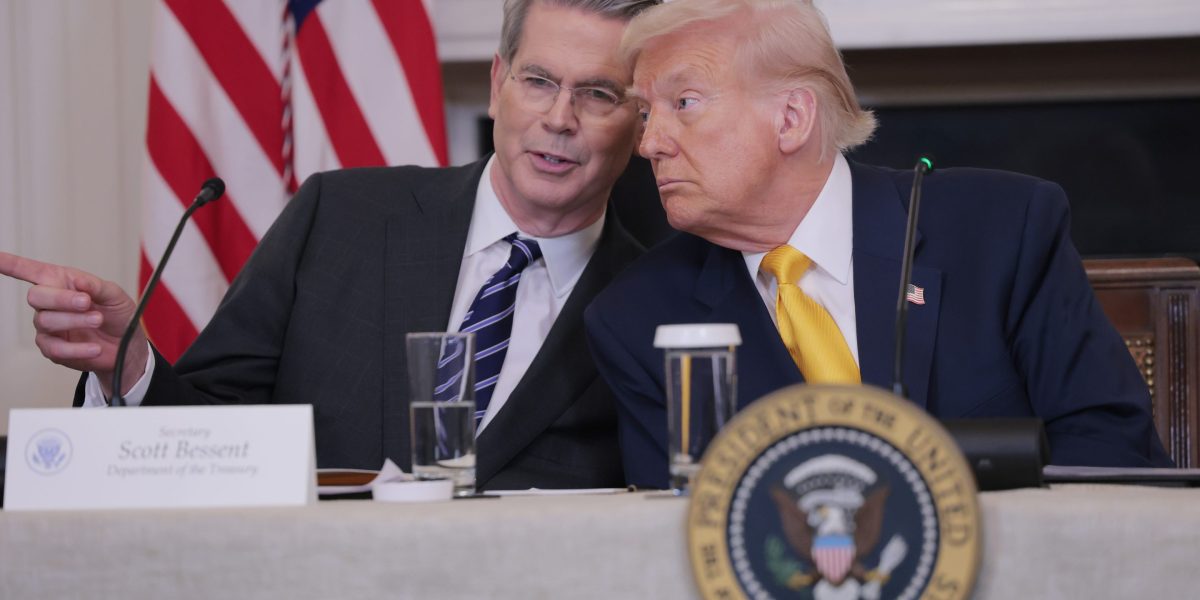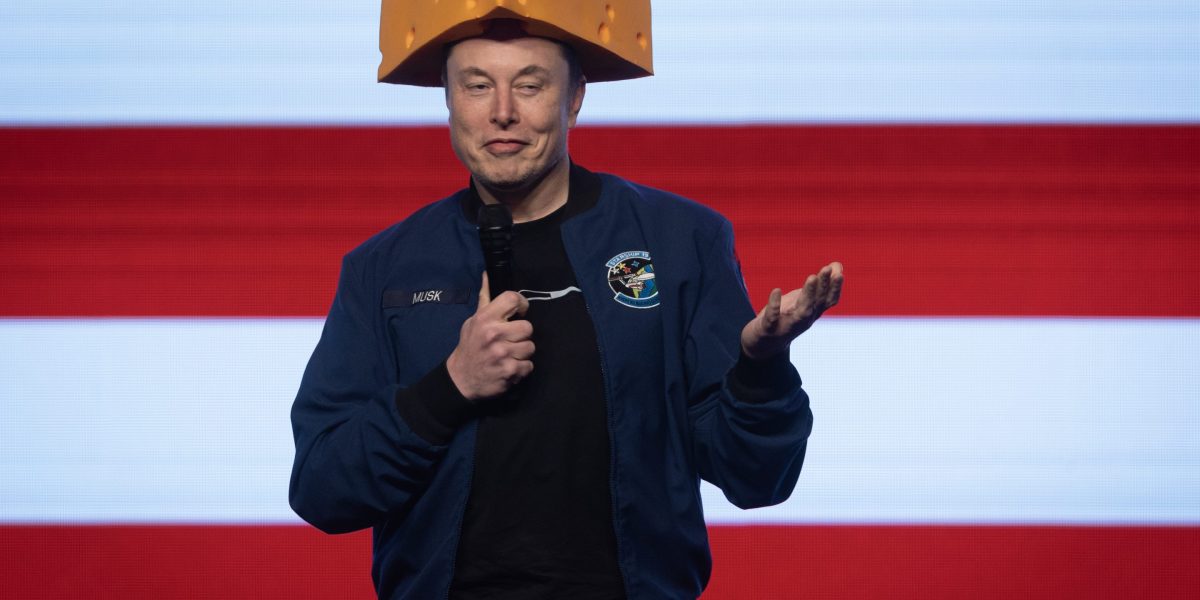- The Trump administration has talked a lot about the yield on the 10-year Treasury, the benchmark for rates on mortgages and other common types of loans, as the president pledges to bring down borrowing costs for Americans. Data suggests more households are exposed to changes in interest rates than swings in the stock market, but the effect of tariffs on inflation might ultimately be the most impactful economic issue for voters.
Donald Trump loved to brag about the stock market at the start of his first stint in the Oval Office. But as share prices tumble amid his on-again, off-again tariff threats and mounting recession fears, the president has indicated he’s no longer using the S&P 500, which closed in correction territory on Thursday after the index dropped 10% from its high in mid-February, as a yardstick during his second term.
Instead, the new administration, including Treasury Secretary Scott Bessent, has been much more vocal about the bond market and Trump’s pledge to lower borrowing costs for Americans. Bessent has said the president’s focus is on seeing a decline in the yield on the 10-year Treasury note, the benchmark for rates in the country’s nearly $12.6 trillion mortgage market, many corporate bonds, and the government’s own interest payments.
“We’re focused on the real economy. Can we create an environment where there are long-term gains in the market and long-term gains for the American people?” Bessent told CNBC Thursday. “I’m not concerned about a little bit of volatility over three weeks.”
Regardless of Trump’s true feelings, the data suggests Americans are more exposed to changes in interest rates than swings in the stock market. While just about six in 10 Americans report owning stock, according to a 2023 Gallup poll, nearly 80% of American households have some type of debt, according to the Federal Reserve. The 10-year yield has fallen roughly 50 basis points since the week before Trump’s inauguration, though it ticked up to 4.30% Friday morning.
“More voters are impacted by interest rates than the S&P,” political strategist and venture investor Bradley Tusk told Fortune. “But inflation dwarfs both of them.”
It’s clear markets are no fan of tariff uncertainty, though stocks bounced back a bit Friday morning. It remains to be seen whether more protectionist measures will result in slower growth, higher prices, both (the worst-case scenario), or neither. Even as many Americans have presumably seen the value of their 401k and other retirement plans drop in recent weeks, there are signs the decline in yields is already having an impact.
Mortgage rates fell for a month-and-a-half before Freddie Mac’s weekly estimate ticked slightly higher Thursday, though the agency said the average rate on a 30-year mortgage has fallen to 6.65% after surpassing the 7% threshold in early January.
“Despite this minor bump, rates are still at their lowest levels of the year and if they continue to fall, could provide a welcome boost as the spring housing market kicks off,” Lisa Sturtevant, chief economist of multiple listing service Bright MLS, wrote in a note Thursday.
Lower mortgage payments may not address the nation’s structural housing deficit, but they could prod homeowners who have felt “locked in” to rates they obtained before borrowing costs spiked in 2022. Mortgage loan application volume increased 11% last week, according to an index calculated by the Mortgage Bankers Association.
Why Trump is eyeing the 10-year Treasury
Long-term yields are highly correlated with the Federal Reserve’s overnight lending rate for banks, which allows the central bank’s decisions to be transmitted throughout the economy. The relationship isn’t perfect, however, because the market for free-floating assets like the 10-year Treasury is also based on other factors, explained Matt Sheridan, lead portfolio manager for income strategies at AllianceBernstein. Expectations for economic growth, inflation, and fiscal policy also play a role, he said.
Yields, which represent an investor’s annual return, fall as bond prices rise—and vice versa. That tends to happen if investors believe the Fed will be forced to cut rates, which makes the higher payments on existing bonds more attractive relative to new debt.
Conversely, if concern about the government’s debt burden increases, investors might demand a higher return. Over the last few months, Sheridan said, fixed-income investors have worried less about the federal deficit and are now more anxious about the economy. Initially, many traders believed Trump would be focused on pro-growth aspects of his agenda like tax cuts and deregulation.
“I think investors were a little bit surprised the new administration is prioritizing tariffs,” he said.
A White House spokesperson said the bond market’s minor rally reflected the new administration’s efforts to restore “fiscal stability and confidence.”
“President Trump has been committed to restoring our nation’s fiscal credibility, which was undermined by the previous administration’s reckless spending,” Harrison Fields, deputy press secretary and special assistant to the president, said in a statement.
Marko Papic, chief strategist at BCA Research, said it’s wrong to suggest Trump wasn’t willing to look past equity volatility during his first term. After all, despite the president citing the stock market’s performance roughly once roughly every 35 hours throughout January 2018, per Politico, the S&P 500 eventually declined 6% that year as Trump launched a first trade war with China.
“President Trump tweets about the stock prices when they go up,” Papic said, “and he doesn’t when they go down.”
Some demographics that tend to have lower exposure to the stock market have also appeared to gravitate to Trump, who bested Harris and his own 2020 performance in November among voters without a college degree and those making less than $100,000.
“They probably don’t care about the stock market, but they [also may not be] in the market to buy a new home,” said Tusk, who served as campaign manager for former New York City mayor Michael Bloomberg.
“But what they do do is buy groceries,” he added, “or they might want to buy a new truck.”
Auto loans aside, that’s why inflation and potential price increases from tariffs, he said, are the economic issues that loom largest.
Correction: This story was corrected to reflect that the report from Politico found President Donald Trump boasted roughly once every 35 hours during January 2018.
This story was originally featured on Fortune.com
Source link

 Entertainment8 years ago
Entertainment8 years ago
 Politics8 years ago
Politics8 years ago
 Entertainment8 years ago
Entertainment8 years ago
 Entertainment8 years ago
Entertainment8 years ago
 Tech8 years ago
Tech8 years ago
 Tech8 years ago
Tech8 years ago
 Tech8 years ago
Tech8 years ago
 Politics8 years ago
Politics8 years ago







